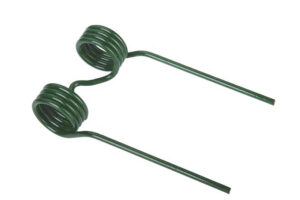The Ultimate Guide to Custom Small Torsion Springs
 Are you in need of a custom small torsion spring for your project? Look no further! In this post, we will guide you through everything you need to know about custom small torsion springs.
Are you in need of a custom small torsion spring for your project? Look no further! In this post, we will guide you through everything you need to know about custom small torsion springs.
What is a Torsion Spring?
A torsion spring is a type of spring that works by twisting or rotating. It stores mechanical energy when twisted and releases it when it returns to its original position. Torsion springs are commonly used in various applications, including garage doors, clothespins, and toys.
What is a Custom Small Torsion Spring?
It is a torsion spring that is specifically designed and manufactured to meet the unique needs of a particular project. These springs are typically smaller in size and have a specific shape and configuration to fit the application.
Why Choose a Custom Small Torsion Spring?
There are several reasons why you might choose a custom small torsion spring over a standard off-the-shelf spring. Firstly, a custom spring can be designed to fit the exact specifications of your project, ensuring optimal performance and efficiency. Secondly, a custom spring can be made from a variety of materials, including stainless steel, music wire, and titanium, to suit your specific needs. Finally, a custom spring can be manufactured in small quantities, making it a cost-effective solution for small-scale projects.
How to Design ?
Designing a custom small torsion spring requires careful consideration of several factors, including the application, the required torque, and the available space. Here are the steps involved in designing a custom small torsion spring:
Step 1: Determine the Application
The first step in designing a custom small torsion spring is to determine the application. This will help you determine the required torque, the available space, and the material requirements.
Step 2: Calculate the Torque
Once you have determined the application, you need to calculate the required torque. This will help you determine the wire size, the number of coils, and the spring rate.
Step 3: Determine the Available Space
The next step is to determine the available space for the spring. This will help you determine the outer diameter, the inner diameter, and the length of the spring.
Step 4: Choose the Material
The final step is to choose the material for the spring. This will depend on the application, the required torque, and the available space. Common materials for small torsion springs include stainless steel, music wire, and titanium.
How to Manufacture?
Manufacturing a custom small torsion spring requires specialized equipment and expertise. Here are the steps involved in manufacturing a small torsion spring:
Step 1: Wire Forming
The first step in manufacturing a custom-made small torsion springs is wire forming. This involves feeding the wire into a machine that shapes it into the desired configuration.
Step 2: Coiling
The next step is coiling. This involves wrapping the wire around a mandrel to create the desired number of coils.
Step 3: Heat Treatment
The next step is heat treatment. This involves heating the spring to a specific temperature to improve its strength and durability.
Step 4: Finishing
The final step is finishing. This involves grinding, polishing, and coating the spring to improve its appearance and protect it from corrosion.
Torsion Spring Manufacturer
|
Material
|
Carbon steel(SWC), Alloy steel, SEA9260/ 9254/ 6150/ SUP9/ SUP10/ SUP12 /, 51CrV4, stainless steel, music wire/piano
wire(SWP);beryllium copper etc. |
|
Wire diameter or thickness
|
0.2~85mm
|
|
Finish
|
Zinc, Chorme, Nickel, Silver, Gold, Tin, Powder coating, Oxide black or customized
|
|
Custom Small Torsion Spring Processing Craft
|
Material purchased-Producing-First testing-Coiling-Inspection-Heat treatment-Cleaning-Surface treatment-Final
testing-Packing-Shipping |
|
Application
|
Industrial/ auto/ Motorcycle/ electronics/ electric power/ Toys/ Sports/ Machinery equipment etc.
|
|
Packing
|
Inner packing with plastic bags, and then carbon boxes for outer packing, at last wooden or plastic pallets for request
|
|
Quality certification
|
IATF 16949:2016, ISO 14001:2015, ISO9001:2015, OHSAS 18001:2007
|
Conclusion
In conclusion, a custom small torsion spring is a versatile and cost-effective solution for a wide range of applications. By following the steps outlined in this post, you can design and manufacture a custom small torsion spring that meets your unique needs and specifications. So, what are you waiting for? Get started on your own torsion spring project today!






